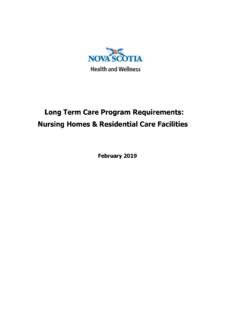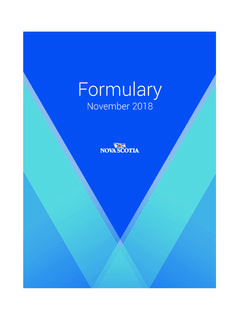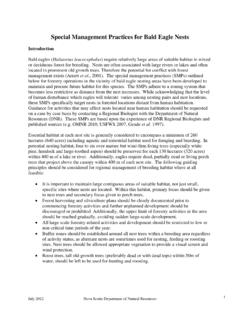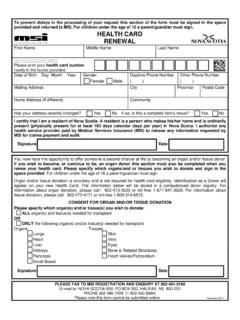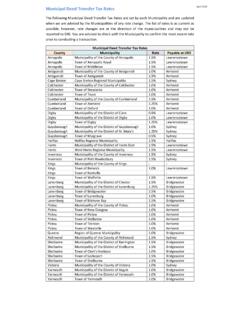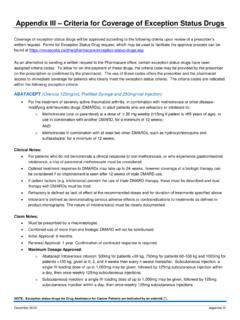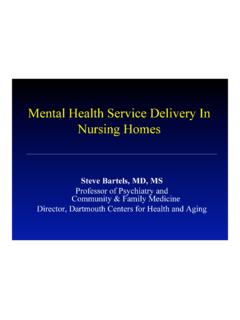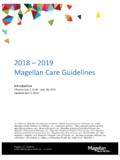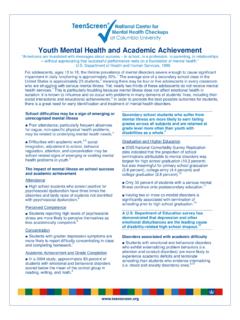Transcription of Standard: Mental Health Outpatient Services Standards
1 Standard: Mental Health Outpatient Services Standards Originating Branch: Mental Health , Children's Services , and Addictions Original Approval Date: June 19, 2008 Review Date: September 23, 2013. Approved By: Frances Martin, Acting Deputy Minister, Health and Wellness Standards for Mental Health Services in Nova Scotia In Canada Mental illness is the second leading cause of human disability and premature death. $51. billion is the estimated annual cost of Mental illness to the Canadian economy, in terms of Health care and lost productivity. On any given week, at least 500,000 employed Canadians are unable to work due to Mental illness, including approximately 355,000 disability cases due to Mental and/or behavioral disorders plus approximately 175,000 full-time workers absent from work due to Mental Health issues.
2 Mental Health is the number one cause of disability in Canada, accounting for nearly 30% of disability claims and 70% of the total costs. System-level Standards for Mental Health Services in Nova Scotia have been drafted by the Core Programs Standards Working Group of the Mental Health Steering Committee. Numerous system stakeholders were involved in reaching consensus on Standards based on the best available information regarding effectiveness and/or best practice, balanced by the perspective of consumers, expert practitioners and educators. Input will continue to be sought and revisions will take place every five years to keep pace with best practice evidence. Core program Standards form the foundation for long-term improvement in Mental Health Services .
3 An overarching set of generic Standards represent the preferred conditions relevant to all Mental Health service delivery. The core program Standards define the key service components to be achieved within each of the core programs. Core programs are accessible to all Nova Scotians as part of a comprehensive Mental Health system. Nova Scotia's core programs, as referenced in the work of the Federal/Provincial/Territorial Advisory Network on Mental Health (2001), are: Outpatient and outreach Services Community supports Reviewed Jan31 2014 1 | P a g e Inpatient Services Specialty Services The Standards are intended to provide guidance for quality service delivery and reduce variations across the province, while maintaining flexibility to adapt approaches to unique district, community and organization conditions.
4 In additional there will be: Foundation Standards which apply across all DHAs and IWK. Network & EIBI Standards for speciality Services Guiding Principles Standards for Outpatient Services must address the following: clear evidence of a patient centred /family centred philosophy the promotion of a wellness lifestyle and a rehabilitative approach the provision of a full range of medical care the collection and analysis of outcome measures the special needs of differing cultures and vulnerable populations clear accountability for the efficacy of Services the provision of a continuum of care for patients both with partner Services in the community at large Development Process & Methodology To inform the Standards development process, a situational analysis of current Inpatient Services and Supports provided by Mental Health and addiction Services in NS was conducted.
5 As well as a cross- jurisdictional review of relevant policies, guidelines, and Standards was completed. Using this information as a foundation, as well as key references from the literature regarding promising and emerging practices, a set of Standards was developed by representatives of Mental Health and addictions Services staff from across the province. Effective intervention for Mental illness requires close collaboration between DHW Mental Health branch and DHAs and the IWK. In addition to the Accreditation Canada Mental Health Service Standards and these Standards aim to improve the quality of service delivery of Mental Health Services in the DHAs Reviewed Jan31 2014 2 | P a g e and the IWK, and comply with the DHW quality framework which sets expectations of activity and performance in the Health system through the development and monitoring of Standards .
6 The Standards include a specific set of indicators contained within a monitoring report. The indicators will enable the DHAs and the IWK to monitor the extent to which progress is being made towards meeting the System Standards for Inpatient Services . However, it must be noted that the indicators are generic in nature until such time as we have a provincial data collection system to capture very specific data and allow for very specific indicators. At present we will be using a template to monitor compliance for the DHAs and the IWK to report on and will visit the stakeholders to ensure their audited responses are accurate and to make recommendations on areas they are having difficulty with.
7 Outpatient Services Outpatient Mental Health Services are provided by a multidisciplinary assessment or treatment team. Individual treatment and support and group programs are available across the province. The types of groups offered in communities include anger management, anxiety management, stress management, depression management and recovery ( walking group; Community Social Group). Outpatient Services Standards are comprised of four service areas: 1. Early Identification/Intervention Services 2. Crisis and Emergency Response Services 3. Individual, Group and Family Services 4. Collaborative Care Services Early Identification/ Intervention Services Early identification and intervention across the life span is founded on the understanding that collaboration with primary Health and community agencies is essential.
8 Early identification/intervention Services : Identify and assess early signs and symptoms of Mental illness;. provide early intervention to prevent progression to a diagnosable illness;. referral of diagnosed metal illnesses for treatment and support reduce impact of Mental illness; and foster hope for future well-being. A framework of early identification and intervention Services includes: identification of at risk individuals and populations targeted intervention for individuals and groups at risk [ young children, school age children, Reviewed Jan31 2014 3 | P a g e individuals with co-occurring Mental illness and substance use disorders, older adults and individuals involved in the criminal justice system].
9 Linkages between Mental Health , primary care and community agencies for screening and intervention across the life span. Crisis and Emergency Response Services The capacity to provide a crisis and emergency response service (CRS) is an integral part of a collaborative and culturally sensitive Mental Health service's continuum of care. Due to the complexities of the presenting issues and the presumption that crises are determined and defined by the individuals experiencing them, there is a continuum of presentations of crises/emergencies and corresponding responses. The continuum moves from psychosocial crisis through to psychiatric emergency. Psychosocial crises manifest in many ways, ranging from an acute presentation of Mental illness to the emotional consequences of the loss of housing and other psychosocial stressors.
10 A crisis occurs when an individual's usual coping strategies are overwhelmed by the presenting situation and the individual requires an urgent response. The goal of the intervention is to provide support to enable the individual to handle the crisis while remaining in the community. Psychiatric emergencies occur when an individual's coping strategies are significantly compromised and there is potential for harm to self or others, or the individual's well-being is seriously threatened. An emergent response is required. The goal of intervention is to facilitate access to both a secure environment and active treatment. Serious and persistent Mental illness can increase both the number of crises a person experiences as well as the individual's response to crisis.
